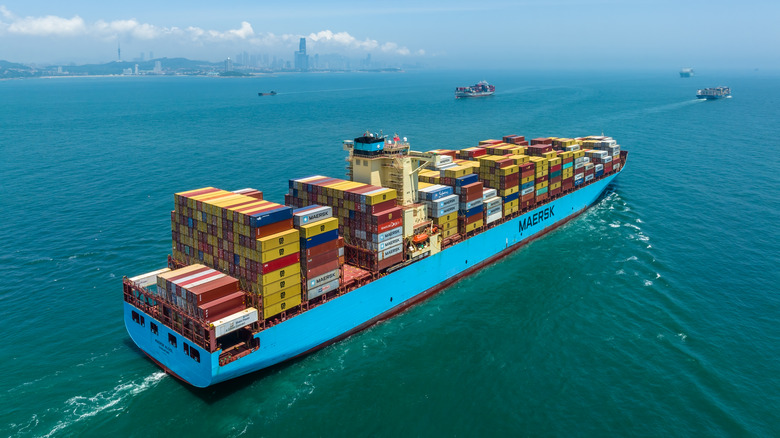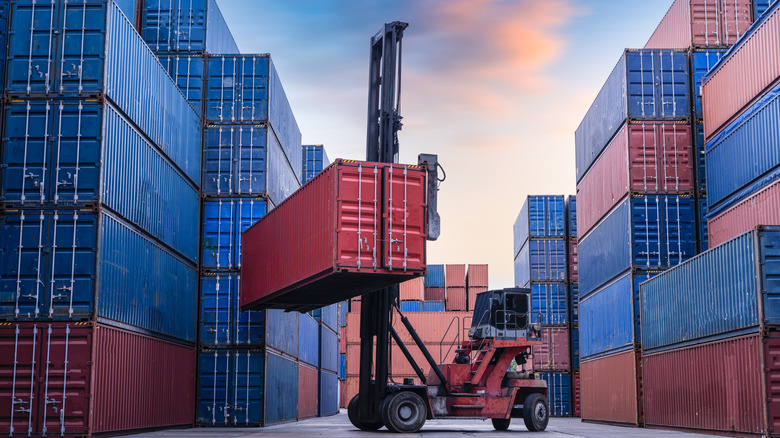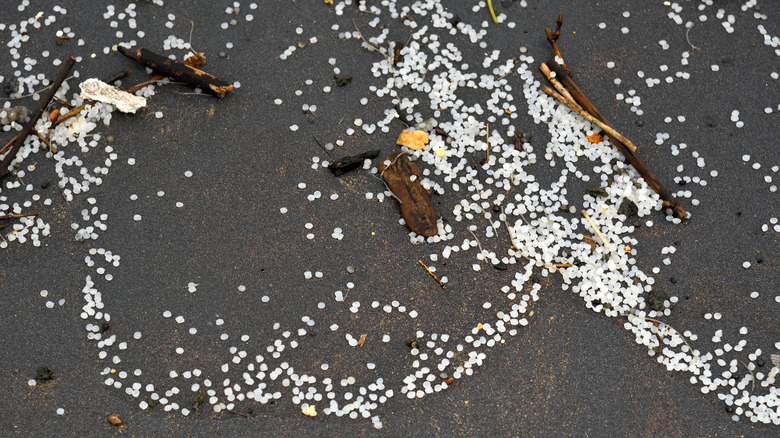What Happens To Shipping Containers That Fall Overboard?
If you were to list inventions that most affect your life, shipping containers likely would not make the top ten. However, these simple metal storage boxes play a crucial role in transporting close to 80 percent of all global trade via cargo ships. Most of the imported items you see around might have reached you in a shipping container on a cargo ship.
Currently, there are close to 65 million containers in circulation that move everything from toys, clothes, electronics, bicycles, and even toxic chemicals between countries. That said, accidents such as onboard fires, physical damage, and collisions are bound to happen when shipping such a gargantuan number of containers. Shipping containers may also fall off the ship due to improper handling or harsh seas, resulting in the loss of cargo.
According to the World Shipping Council, an average of 1,061 containers were lost annually between 2021 and 2023. While the economic impact of 1,061 containers might seem like a lot, it is actually miniscule (though there have been numerous expensive cargo loses in the past) considering 250 million containers worth $7 trillion are shipped annually. Most lost containers sink to the bottom, however, floating containers and ones carrying toxic chemicals can be extremely harmful to the marine ecology and ships traveling in the water.
The many reasons shipping containers are lost at sea
Shipping containers can fall overboard for a variety of reasons. Human errors such as improper stacking or not taking the weight of the containers into account can cause the containers to tumble like a misaligned stack of Jenga blocks. Even if the containers are stacked properly, harsh seas or collisions can cause the containers to tumble and fall into the sea.
Another factor that indirectly leads to lost containers is the growing size of cargo ships. Modern cargo ships can move close to ten times the freight that ships from five decades ago could carry. Some of the biggest ships in the world like the Evergreen Ever Apex are close to 1300 feet in length and boast a cargo capacity of 225,000 tons. However, such large cargo ships are at a significantly higher risk of losing containers due to the absurd number of containers they can fit. According to a Gard report, 9% of all ultra-large cargo vessels (ones that can carry over 15,000 TEUs) had faced container losses, while only 1% of small feeder ships (ones that can carry less than 3,000 TEUs) had previously lost containers.
The impact of lost containers
Currently, shipping companies are not mandated to disclose the number of containers lost at sea. The official number as per World Shipping Council reports is around 21,924 containers from 2008-2022, but the actual figures could be much higher. Most of these lost containers are never recovered, acting as a rude intruder to marine life. Many shipping containers simply sink to the bottom when they fall off a ship, first crushing plants and animals under its weight and subsequently damaging the local ecology of the impacted space.
Other containers might float on the surface for weeks or months due to their floatable contents or due to their construction (refrigerated containers often float for months due to their insulated structure). Floating containers, especially ones that float only a few feet above the surface, are a menace to ships and yachts globally. As these floating containers are hard to detect on radars, they have caused numerous collisions in the past.
However, lost containers cause the most harm when carrying substances toxic to marine life. One recent example is the X-Press Pearl fire that caused the cargo ship to sink near the Sri Lankan coast in 2021. The ship lost 1,400 containers in the shallow coastal waters dumping billions of small plastic pellets, harmful chemicals such as nitric acid, lead, along with the oil spilled from the fuel tank. Considered to be the worst marine disaster in Sri Lanka's history, the toxic contents ended up killing thousands of fish, sea turtles, dolphins, and even whales.


